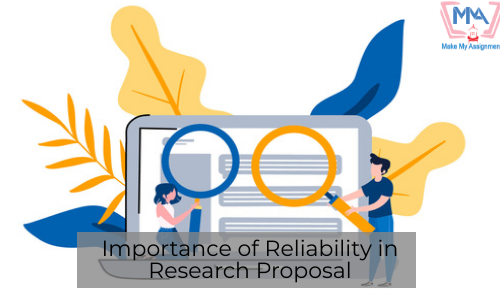
Importance of Reliability in Research Proposal
While writing for your research paper, you need to first clarify the objective of your research problem that is crucial for the proposal. The research proposal is where you briefly explain and present a clear summary of your proposed research. With the help of this proposal, the researcher justifies the need for a research problem and presents the key questions or issues that need to be addressed.
It is important to state authentic and reliable data in your research proposal. And for doing this, you need to perform research carefully. If your research is not reliable, then the end product would be unstable, and you’ll have to face the consequences for the same.
Importance of reliability in research proposal
Reliability is something significant that needs to be deliberated throughout the data assemblage process. It helps ensure that the result is stable, precise and reproducible. The two most important things that you need to consider to ensure reliability in your research proposal are-
- Reliable application of methods
While performing research, you must carry out similar steps in the same way for each of its dimensions. In other words, we can say that you need to make sure that all the things are organized in the same and perfect manner. However, reliability is crucial in every research proposal.
- Standardize conditions
At times, exterior factors might create dissimilarity in the end product. So, while collecting information, make sure that you keep the conditions as reliable as possible.
Types of reliability
While applying reliability to a wide range of activities, it should be kept as a prominent factor that can help proficiently craft your research proposal. The four major types of reliability are-
Equivalency reliability
Under this type, two objects measure the same concepts that too at an equivalent stage of difficulty. Further, it is used to highlight the certain degree of association between the two, which is determined by linking the test scores of certain disciplines. In a research proposal, especially the one undertaken for experimental and quantitative studies, a correspondent coefficient (statistically denoted as ‘r’) is used to demonstrate the correlation between an independent variable and a dependent variable. These are further operated to conclude effects on the dependent variable.
Stability reliability
Stability reliability, also known as re-test reliability, is the agreement under which we assess executions over time. The test or measurement is recapped on the same matters at a future date that can help determine stability in the given research proposal. Thus, we can say that outcomes are connected and coordinated with a primary test to guarantee stability.
Internal consistency reliability
Under this type of reliability, procedures or tests further evaluate the identical skill, quality or characteristic. Further, we can say that it measures the accuracy level between the measuring instruments or the bystanders used in a study. Internal consistency reliability helps the researcher calculate the value of scores, limit the correlations and interpret data amongst variables.
Interrater reliability
When it comes to interrater reliability, we can simply define it as the type where two or more entities agree. Further, it addresses the steadiness of the applied evaluation system.
So, this was all about the significance of reliability in a research proposal and some of its major types of writing. Apart from this, if you want to make your research proposal more reliable, then you can take help from our online assignment writing experts.



